英语单词构成法
12种英语构词方法
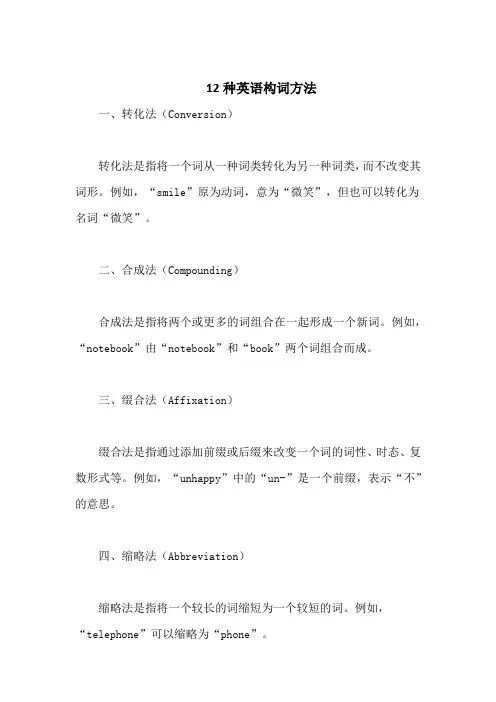
12种英语构词方法一、转化法(Conversion)转化法是指将一个词从一种词类转化为另一种词类,而不改变其词形。
例如,“smile”原为动词,意为“微笑”,但也可以转化为名词“微笑”。
二、合成法(Compounding)合成法是指将两个或更多的词组合在一起形成一个新词。
例如,“notebook”由“notebook”和“book”两个词组合而成。
三、缀合法(Affixation)缀合法是指通过添加前缀或后缀来改变一个词的词性、时态、复数形式等。
例如,“unhappy”中的“un-”是一个前缀,表示“不”的意思。
四、缩略法(Abbreviation)缩略法是指将一个较长的词缩短为一个较短的词。
例如,“telephone”可以缩略为“phone”。
五、逆生法(Backformation)逆生法是指将一个较长的词缩短为一个较短的词,并添加一个后缀来恢复原词的完整形式。
例如,“telecast”可以逆生为“broadcast”。
六、拟声法(Onomatopoeia)拟声法是指模仿声音来创造新词。
例如,“clang”模仿了金属碰撞的声音。
七、缀词法(Clipping)缀词法是指将一个词的前部分或后部分去掉,只保留中间部分。
例如,“ advertisement”可以缀为“ad”。
八、首字母缩写法(Acronymy)首字母缩写法是指将一组词的首字母组合成一个新词。
例如,“NATO”是“North Atlantic Treaty Organization”的首字母缩写。
九、混成法(Blending)混成法是指将两个或更多的词的部分混合在一起形成一个新词。
例如,“spaghetti”由“spaghetti”和“bottle”两个词混合而成。
十、词类转换法(Word Class Conversion)词类转换法是指将一个词从一种词类转换为另一种词类,同时改变其词形。
例如,“smile”可以转换为名词“smile”。
英语单词的构成:独立单词+合成词(复合词+派生词)
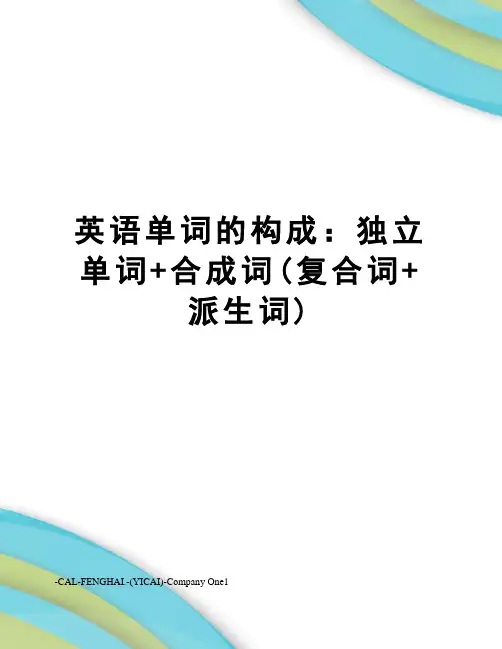
英语单词的构成:独立单词+合成词(复合词+派生词)-CAL-FENGHAI.-(YICAI)-Company One1英语单词的构成:独立单词+合成词(复合词+派生词)合成词:一般加上连字符“-”,在不引起歧义的情况下,将其省略。
复合词:两个或两个以上独立的词在一起出现,构成一个复合词。
派生词:派生词,是英语主要的构词法。
这方法是借前缀或后缀之助,制造出派生词,主要有名词、形容词和动词三种。
复合词一、复合名词:复合名词在英语中占有很大的数量,通常在句中作主语、宾语;偶尔也可用作定语,但表示的不是该名词的特点,而是该名词的用途。
常见的有以下几种类型:A.“名词+名词”。
例如:1)football足球2)classroom教室 3)housework家务活4)doorbell门铃5)pencil-box铅笔盒B.“名词+动词-ing”。
例如:1)handwriting书法 2)sun-bathing日光浴3)bookkeeping笔记 4)letter-writing书信5)watchmaking钟表制造业C.“动词-ing+名词”。
动词-ing形式在这类复合词中起定语的作用,它与后面名词的关系有两种情况:a.在逻辑上有主谓关系,并用来表示所修饰的名词的特征。
这时动词-ing是现在分词。
例如:1)working people劳动人民 2)running water流水 3)flying fish飞鱼b.在逻辑上没有主谓关系,这时动词-ing是动名词。
例如:1)sitting-room 起居室2)reading-room 阅览室 3)sleeping-pills 安眠药4)building material 建筑材料 5)dining car 餐车D.“动词+名词”。
例如:1)pickpocket 扒手 2)breakwater 防浪堤 3)playground 操场 4)workplace 车间5)driftwood 浮木E.“形容词+名词”。
12种英语构词构成方法
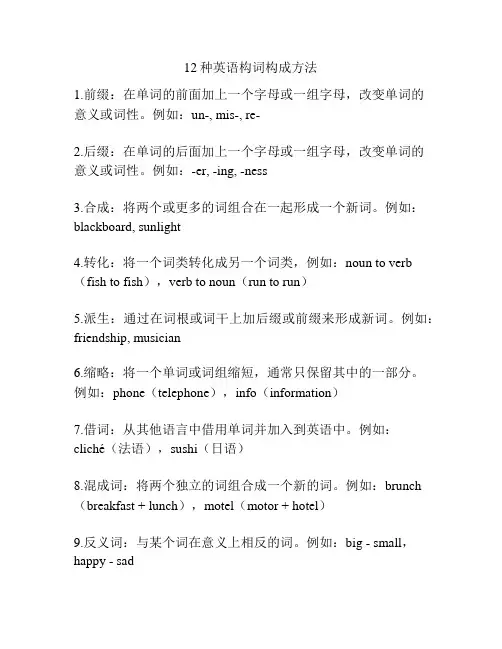
12种英语构词构成方法1.前缀:在单词的前面加上一个字母或一组字母,改变单词的意义或词性。
例如:un-, mis-, re-2.后缀:在单词的后面加上一个字母或一组字母,改变单词的意义或词性。
例如:-er, -ing, -ness3.合成:将两个或更多的词组合在一起形成一个新词。
例如:blackboard, sunlight4.转化:将一个词类转化成另一个词类,例如:noun to verb (fish to fish),verb to noun(run to run)5.派生:通过在词根或词干上加后缀或前缀来形成新词。
例如:friendship, musician6.缩略:将一个单词或词组缩短,通常只保留其中的一部分。
例如:phone(telephone),info(information)7.借词:从其他语言中借用单词并加入到英语中。
例如:cliché(法语),sushi(日语)8.混成词:将两个独立的词组合成一个新的词。
例如:brunch (breakfast + lunch),motel(motor + hotel)9.反义词:与某个词在意义上相反的词。
例如:big - small,happy - sad10.同义词:与某个词在意义上相似的词。
例如:happy - joyful,eat - consume11.折衷词:将两个词的一部分结合在一起形成一个新词。
例如:smog(smoke + fog),chillax(chill + relax)12.音变:通过改变单词的发音或拼写来形成新词。
例如:gonna(going to),wanna(want to)。
英语单词的构成:独立单词+合成词(复合词+派生词)
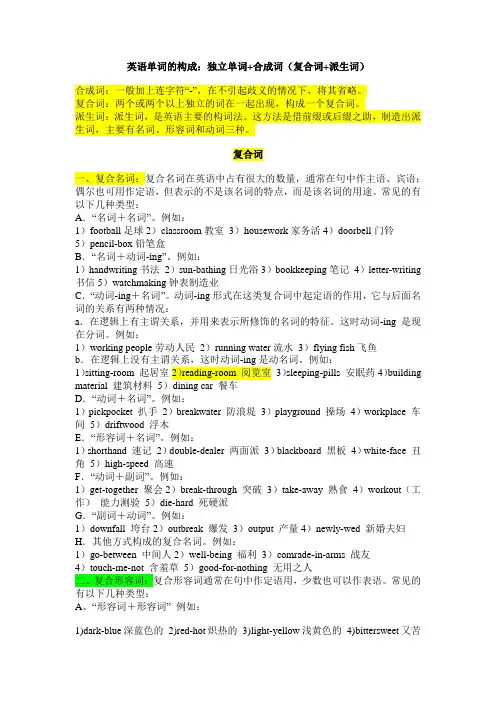
英语单词的构成:独立单词+合成词(复合词+派生词)合成词:一般加上连字符“-”,在不引起歧义的情况下,将其省略。
复合词:两个或两个以上独立的词在一起出现,构成一个复合词。
派生词:派生词,是英语主要的构词法。
这方法是借前缀或后缀之助,制造出派生词,主要有名词、形容词和动词三种。
复合词一、复合名词:复合名词在英语中占有很大的数量,通常在句中作主语、宾语;偶尔也可用作定语,但表示的不是该名词的特点,而是该名词的用途。
常见的有以下几种类型:A.“名词+名词”。
例如:1)football足球2)classroom教室3)housework家务活4)doorbell门铃5)pencil-box铅笔盒B.“名词+动词-ing”。
例如:1)handwriting书法2)sun-bathing日光浴3)bookkeeping笔记4)letter-writing 书信5)watchmaking钟表制造业C.“动词-ing+名词”。
动词-ing形式在这类复合词中起定语的作用,它与后面名词的关系有两种情况:a.在逻辑上有主谓关系,并用来表示所修饰的名词的特征。
这时动词-ing是现在分词。
例如:1)working people劳动人民2)running water流水3)flying fish飞鱼b.在逻辑上没有主谓关系,这时动词-ing是动名词。
例如:1)sitting-room 起居室2)reading-room 阅览室3)sleeping-pills 安眠药4)building material 建筑材料5)dining car 餐车D.“动词+名词”。
例如:1)pickpocket 扒手2)breakwater 防浪堤3)playground 操场4)workplace 车间5)driftwood 浮木E.“形容词+名词”。
例如:1)shorthand 速记2)double-dealer 两面派3)blackboard 黑板4)white-face 丑角5)high-speed 高速F.“动词+副词”。
单词的形成方式
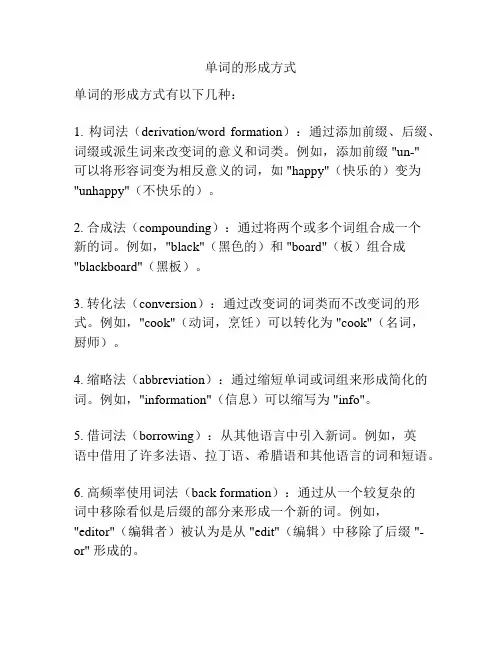
单词的形成方式单词的形成方式有以下几种:1. 构词法(derivation/word formation):通过添加前缀、后缀、词缀或派生词来改变词的意义和词类。
例如,添加前缀 "un-"可以将形容词变为相反意义的词,如 "happy"(快乐的)变为"unhappy"(不快乐的)。
2. 合成法(compounding):通过将两个或多个词组合成一个新的词。
例如,"black"(黑色的)和 "board"(板)组合成"blackboard"(黑板)。
3. 转化法(conversion):通过改变词的词类而不改变词的形式。
例如,"cook"(动词,烹饪)可以转化为 "cook"(名词,厨师)。
4. 缩略法(abbreviation):通过缩短单词或词组来形成简化的词。
例如,"information"(信息)可以缩写为 "info"。
5. 借词法(borrowing):从其他语言中引入新词。
例如,英语中借用了许多法语、拉丁语、希腊语和其他语言的词和短语。
6. 高频率使用词法(back formation):通过从一个较复杂的词中移除看似是后缀的部分来形成一个新的词。
例如,"editor"(编辑者)被认为是从 "edit"(编辑)中移除了后缀 "-or" 形成的。
除了上述方式外,还有一些其他形成单词的方式,如吸收外来词(loanwords)、混合词(blending)、模仿声音词(onomatopoeia)等。
单词的形成方式的多样性使得语言能够不断发展和适应社会的需求。
英语八大构词法及举例
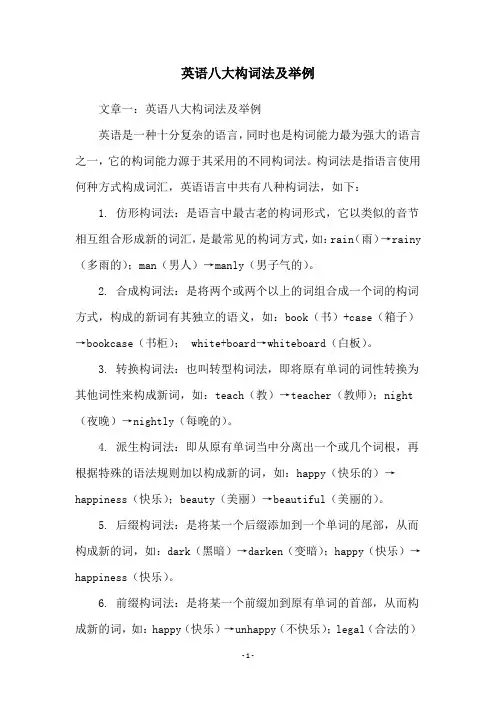
英语八大构词法及举例文章一:英语八大构词法及举例英语是一种十分复杂的语言,同时也是构词能力最为强大的语言之一,它的构词能力源于其采用的不同构词法。
构词法是指语言使用何种方式构成词汇,英语语言中共有八种构词法,如下:1. 仿形构词法:是语言中最古老的构词形式,它以类似的音节相互组合形成新的词汇,是最常见的构词方式,如:rain(雨)→rainy (多雨的);man(男人)→manly(男子气的)。
2. 合成构词法:是将两个或两个以上的词组合成一个词的构词方式,构成的新词有其独立的语义,如:book(书)+case(箱子)→bookcase(书柜); white+board→whiteboard(白板)。
3. 转换构词法:也叫转型构词法,即将原有单词的词性转换为其他词性来构成新词,如:teach(教)→teacher(教师);night (夜晚)→nightly(每晚的)。
4. 派生构词法:即从原有单词当中分离出一个或几个词根,再根据特殊的语法规则加以构成新的词,如:happy(快乐的)→happiness(快乐);beauty(美丽)→beautiful(美丽的)。
5. 后缀构词法:是将某一个后缀添加到一个单词的尾部,从而构成新的词,如:dark(黑暗)→darken(变暗);happy(快乐)→happiness(快乐)。
6. 前缀构词法:是将某一个前缀加到原有单词的首部,从而构成新的词,如:happy(快乐)→unhappy(不快乐);legal(合法的)→illegal(非法的)。
7. 借词构词法:是指借用他语中的词汇作为英语词汇的来源,如:Alps(阿尔卑斯山)→kaiser(凯撒,皇帝);science(科学)→borracho(醉鬼);cafe(咖啡馆)→tortilla(玉米饼)。
8. 固定结构构词法:是指某些特定的词汇结构,如:is+形容词+enough(够)→enough(够);do+动词+the+形容词+way(方式)→dothe+形容词+way(以…方式做)。
英语单词构词法
英语的构词法主要有:
一、加词缀法(affixation)
加词缀法分为屈折变化法(inflexion)和派生法(derivation) 0
屈折变化法是指词尾有表示名词复数、格、第三人称单数、动词时态的后缀以及有表示形容词和副词比较级和最高级的后缀。
派生法是给词根添加上前缀或后缀而构词。
二、复合法(compound)
复合词大部分由两个自由词素构成。
三、缩合法(blending)
用两个或两个以上自由词素各自的一部分构成新词。
四、转化法(conversion)
1.名词转化为动词
2.动词转化为名词
3.形容词转化为动词
五、缩写法(abbreviation)
缩写法主要有下列六种:
1.缩略(clipping)
2.首字母缩略词(initialism)
3.省略(omission)
4.缩约(contraction)
5.替换(substitution)
具体方法如下:。
英语单词的构词法
英语单词的构词法英语单词的构成主要有派生、合成和转换三种。
派生分——前缀、后缀。
一、派生前缀——在词首添加固定字母组合,通常改变词义,不改变原词性。
如:动词否定前缀:dis——discover发现形容词、副词否定前缀:un,im,in——unhappy不高兴,impossible不可能动词的重复前缀:re——redo重做,recite背诵,record记录名词的遥远前缀:tele (多用于电信)——television,telescope望远镜,telegraph电报后缀——在词尾添加固定字母组合,通常改变词性,不改变原基本词义。
如:形容词后缀ful(基本词full)表示充满了什么——colorful天气后缀y——windy,sunny注意:少数后缀既改词义又改词性。
如:less为否定后缀(基本词为little的比较级)——homeless(无家)前缀构词法一览表后缀构词法一览表副词、数词、动词后缀1、词形变化最活跃的词——名词、形容词。
2、名词可以变形容词,形容词可以变副词,但名词不能直接变为副词,必须通过形容词过渡。
如:luck(名词)——lucky(形容词)——luckily(副词)care(名词)——careless(粗心的)——carelessly(粗心地)ly通常是副词的标志词尾,但少数名词+ly结尾的却是形容词。
如:friendly友好的,友谊的 lovely 可爱的,有趣的lively活泼的,活跃的 *lonely孤独的,独立的(alone孤独地,副词)二、合成合成构词法三、转换转换构词法四、缩略词五、轻松单词的识记办法——“团记”。
初中英语语法之构词法讲解
形容词+动词-ing形式:good-looking相貌好看的easy-going脾气随和的
副词+动词-ing形式:hard-working students勤劳的far-reaching深远的long-lasting耐用的
副词+形容词:ever-green trees常青树
形容词+形容词:light-blue浅蓝色的
动词+副词:see-through pool透明的
介词+名词:downhill下坡的uphill上山的
(3)合成动词
副词+动词:ill-treat虐待undergo经历overhear(无意)听见overthrow推翻
inter-(相互;之间):international, interrelation
en-(使可能):encourage, enablear, disagree, discourage, disappoint, dishonest,
in-/il-/im-/ir-(不;非):invisible(看不见的),illogical, illegal(非法的), impolite, impossible, irregular, irresponsible
un-/non-(不;非):unfit, unfair, unknown, non-conductor(非导体)
He visited the summer palace yesterday. 他昨天参观了颐和园。(动词)
we paid a visit to the scientist last week. 我们上星期拜拜访了那位科学家。(名词)
He likes a quiet smoke after supper. 他喜欢在晚饭后静静地抽了一会儿烟。(名词)
词的六种构成方式
词的六种构成方式词的六种构成方式★1. 词缀法(affixation):派生法(derivation)的一种,利用词缀(词根加前缀和后缀)构成新词。
Affixation (Derivation) -- the formation of words by adding word affixes to a root. (derivative派生词)According to their position, affixation falls into: prefixation and suffixation. Prefixation -- the formation of new words by adding prefixes to roots. It does not change the word-class of the stem but change its meaningSuffixation --Suffixation is the formation of new words by adding suffixes to roots. Change the grammatical function of roots (the word class). Suffixes can be grouped on a grammatical basis.Prefixes --- Prefixes are affixes that come before the word, such as, pre+war, sub+sea Suffixes --- suffixes are affixes that come after the word, for instance, blood+y.★2.转类法(conversion): 无须借助词缀(零位派生)即由一种词类转化为另一种词类。
例:名词转化为动词He bused to the city.动词转化为名词He likes a quiet smoke after supper.形容词转化为名词There is only one black in my class.He was knocked out in the first round. (n.)Round the number off to the nearest tenth. (v.)The neighbors gathered round our barbecue. (prep.)The moon was right and round. (adj.)People came from all over the country round. (adv.)Conversion (zero-derivation, functional shift) --Conversion is the formation of new words by converting words of one class toanother class. These words are new only in a grammatical sense. The most productive is between nouns and verbs.A change of grammatical functionThe different range of meaning①Conversion to nouni. Verb to noun-almost all monomorphemic verbs can be used as nouns.have a look/ try/smoke, take a walk/ glance/shower,make a move/ guess/ offer/ attempt, give a cry/ start/ shudderflow over---overflow, break out---outbreak, take in---intake1) doer of the action: cheat( one who cheats), cook, coach, flirt, help2) result of the action: catch ( what is caught), find, reply, reject, import3) tool or instrument to do the action with: cover (used to cover something), wrap, cure4) place of the action: pass ( where one has to pass), walk ( a place for walking), dump, divide, turn, retreat, hide-out5) state of mind or sensation: doubt, want, desire, love, taste6) event or activity: search, laugh, attempt, release, shut-down, intake, outbreakii. Adjective to noun (full conversion, partial conversion)1. Words fully converted-a noun converted from an adjective has all the characteristics of nouns. It can take an identical article or –e(s).E.g. a white, a liberal, finals, a given, a drunknative--- two natives, the native’s language, young marrieds, newly-weds2. Words partially converted–do not possess all the qualitiesa noun does. They must be used together with definite articles. They retain some of the adjective features. Words of this class generally refer to a group of the kind.E.g. the poor, the rich, the sick, the wealthy, the wounded, the accused, the sublimethe comparatively rich, the very unfortunate, the most corrupt of them all3. Miscellaneous conversion: nouns from conjunctions, modals, finite verbs, prepositions,etcE.g. Would you like a with or a without? 要不要人陪你?Better to be an also-ran than a never-was. 宁做失败者,不当平庸人。
- 1、下载文档前请自行甄别文档内容的完整性,平台不提供额外的编辑、内容补充、找答案等附加服务。
- 2、"仅部分预览"的文档,不可在线预览部分如存在完整性等问题,可反馈申请退款(可完整预览的文档不适用该条件!)。
- 3、如文档侵犯您的权益,请联系客服反馈,我们会尽快为您处理(人工客服工作时间:9:00-18:30)。
英语单词构词法作者:网络收集(一)前缀1.表示否定意义的前缀1)纯否定前缀a-, an-, asymmetry(不对称)anhydrous(无水的)dis- dishonest, dislikein-, ig-, il, im, ir, incapable, inability, ignoble, impossible, immoral, illegal, irregularne-, n-, none, neither, nevernon-, noesenseneg-, neglectun- unable, unemployment2)表示错误的意义male-, mal-, malfunction, maladjustment(失调)mis-, mistake, misleadpseudo-, pseudonym(假名), pseudoscience3)表示反动作的意思de-, defend, demodulation(解调)dis-, disarm, disconnectun-, unload, uncover4)表示相反,相互对立意思anti-, ant- antiknock( 防震), antiforeign,(排外的)contra-, contre-, contro-, contradiction, controflow(逆流)counter-, counterreaction, counterbalanceob-, oc-, of-, op-, object, oppose, occupywith-, withdraw, withstand2. 表示空间位置,方向关系的前缀1)a- 表示“在……之上”,“向……”aboard, aside,2)by- 表示“附近,邻近,边侧”bypath, bypass(弯路)3)circum-, circu-, 表示“周围,环绕,回转”circumstance, circuit4)de-, 表示“在下,向下”descend, degrade5)en-, 表示“在内,进入”encage, enbed(上床)6)ex-, ec-, es-, 表示“外部,外”exit, eclipse, expand, export7)extra-, 表示“额外”extraction (提取)8)fore- 表示“在前面”9)in-, il-, im-, ir-, 表示“向内,在内,背于”inland, invade, inside, import10)inter-, intel-, 表示“在……间,相互”international, interaction, internet11)intro-, 表示“向内,在内,内侧”introduce, introduce12)medi-, med-, mid-, 表示“中,中间”Mediterranean, midposition13)out-, 表示“在上面,在外部,在外”outline, outside, outward14)over-, 表示“在上面,在外部,向上”overlook, overhead, overboard15)post-, 表示"向后,在后边,次”postscript(附言),16)pre-, 表示"在前”在前面”prefix, preface, preposition17)pro-, 表示“在前,向前”progress, proceed,18)sub-, suc-, suf-, sug-, sum-, sup-, sur-, sus-, 表示“在下面,下”subway, submarine, suffix, suppress, supplement19)super-, sur-, 表示“在…..之上”superficial, surface, superstructure20)trans-, 表示“移上,转上,在那一边”translate, transform, transoceanic21)under-, 表示“在…..下面,下的”underline, underground, underwater22)up-, 表示“向上,向上面,在上”upward, uphold, uphill(上坡)3. 表示时间,序列关系的前缀1)ante-, anti-, 表示“先前,早于,预先”antecedent, anticipate,2)ex-, 表示“先,故,旧”expresident, exhusband3)fore-, 表示“在前面,先前,前面”foreward, dorecast, foretell(预言)4)mid-, medi-, 表示“中,中间”midnight, midsummer5)post-"表示“在后,后”postwar,6)pre-, pri-, 表示“在前,事先,预先”preheat, prewar, prehistory7)pro-, 表示“在前,先,前”prologue(序幕),prophet(预言家)8)re-, 表示“再一次,重新”4. 表示比较程度差别关系的前缀1)by-, 表示“副,次要的”byproduct, bywork(副业)2)extra-,表示“超越,额外”extraordinary,3)hyper- 表示“超过,极度”hypersonic(超声波), hypertesion(高血压)4)out-,表示“超过,过分”outdo(超过), outbid(出价过高的人)5)over-,表示“超过,过度,太”overeat, overdress, oversleep6) sub-, suc-, sur-, ??表示“低,次,副,亚”subeditor, subordinate, subtropical(亚热带)7)super-, sur- 表示“超过”supernature, superpower, surplus, surpass8)under-,表示“低劣,低下”undersize, undergrown, underproduction(生产不足)9)vice- 表示“副,次”vicepresident, vicechairman5. 表示共同,相等意思的前缀1)com-, cop-, con-, cor-, co- 表示“共同,一起”。
connect, combine, collect, combat, coexist, co-operate2)syn-, syl-,sym-,表示“同,共,和,类”symmetry, sympathy, synthesis(合成)6. 表示整个完全意思的前缀1)al- 表示“完整,完全”alone, almost,2) over-表示“完全,全”overall, overflow(充满)3) pan-表示“全,总,万”panentheism(泛神论),panorama7. 表示分离,离开意思的前缀1)a- ab-, abs-,表示“分离,离开”away, apart, abstract, abstain2)de- 表示“离去,处去”depart, decolour,3)dis-, di-, dif-, 表示“分离,离开”divorce, disarm(缴械)4)ex-, e-, 表示“离开,分离”expel, exclude, expatriate(驱出国外)5)for- 表示“离开,脱离”forget, forgive6)表示“离开”release, resolve7)表示“分离,隔离”separate, seduce, select8. 表示通过,遍及意思的前缀1)dia-,表示“通过,横过”diameter, diagram,2)per-, pel-, 表示“通,总,遍”perfect, perform, pervade(浸透)3)trans-, 表示“横过,贯通”transparent, transmit, transport9. 表示加强意思的前缀a-, arouse, ashamedad-, adjoin, adhere( 粘着)10. 表示变换词类作用的前缀be-, befriend,en-, enslave, enable, enrichad-, ac-, af-, ag-, an-, ap-, ar-, as-, at-, adapt, accord, affix, aggression, arrive, assist, attend, attract, arrange, assign(委派)11. 表示数量关系的前缀1)表示“单一”,“一”mon-, mon-, monotone(单调),monopoly, monarchuni-, un-, uniform, unicellular(单细胞)2)表示“二,两,双”ambi-, ambiguous, amphibian(两栖类)bi-, bin- bicycle, di-, diode(二级管),twi-, twilight3)表示“十”deca, deco-, dec- deci-, decade, decimals4)表示"百,百分子一"?hecto-, hect-, hectometer,centi-, centimeter5)表示"千,千分子一”kilo-, kilometer6)表示"万,万分子一”myria-, myri-, myriametremega-, meg-, megabytemicro-, microvolt (微伏特)7)表示"许多,复,多数”multi-, mult-, multipmetre (万用表)poly-, polysyllable,8)表示“半,一半”hemi-, hemispheredemi-, demiofficialsemi-, semiconductor, semitransparentpene-, pen-, peninsula12. 表示特殊意义的前缀1)arch-, 表示“首位,第一的,主要的”architect, archbishop2)auto-, 表示“自己,独立,自动”automobile, autobiography3)bene-, 表示“善,福”benefit4)eu-, 表示“优,美好”eugenics(优生学),euphemism5)male-, mal- 表示“恶,不良”maltreatment, malodor,6)macro-, 表示“大,宏大”macroscopic(宏观)7)magni-, 表示“大”magnificent8)micro-, 表示“微”microscope13. 表示术语的前缀1)aud-, 表示“听,声”audience,2)bio-, 表示“生命,生物”biography(传记)3)ge-, 表示“地球,大地”geography4)phon-, 表示“声,音调”phonograph5)tele-, 表示“远离”television, telephone(二)后缀1. 名词后缀(1) 具有某种职业或动作的人1)-an, -ain, 表示"……地方的人,精通……的人”American, historian,2)-al, 表示"具有……职务的人" principal,3)-ant,-ent, 表示"……者”merchant, agent, servant, student,4)-ar, 表示"……的人”scholar, liar, peddler5)-ard, -art, 表示"做……的人”coward, laggard, braggart(夸张者)6)-arian, 表示"……派别的人,……主义的人”humanitarian, vegetarian7)-ary, 表示"从事……的人" secretary, missionary8)-ant, 表示"具有……职责的人" candidate, graduate9)-ator, 表示"做……的人" educator, speculator(投机者)10)-crat, 表示"某种政体,主义的支持者" democrat, bureaucrat11)-ee, 表示"动作承受者" employee, examinee12)-eer, 表示"从事于……人" engineer, volunteer13)-er, 表示"从事某种职业的人, 某地区,地方的人" banker, observer, Londoner, villager14)-ese, 表示" ……国人,…..地方的人”Japanese, Cantonese15)-ess, 表示"阴性人称名词,actress, hostess, manageress16)-eur, 表示"……家”amateur, littérateur17)-ian, 表示"……地方人,信仰…….教的人,从事……职业的人”Christian, physician(内科医生),musician18)-ician, 表示"精通者,……家,”electrician, magician, technician19)-icist, 表示"……家,…….者, …….能手”physicist, phoneticist, technicist20)-ic, 表示"……者,……师" mechanic, critic21)-ie, 表示"爱,指小" dearie, auntie, lassie(小姑娘)22)-ier, 表示"从事……职业”cavalier, clothier, brazier(黄铜匠)23)-ine, ian, 表示"阴性人称" heroine, ballerina24)-ist, 表示"从事……研究者,信仰……主义者" pianist, communist, dentist, artist, chemist25)-ive, 表示"动作者,行为者”native, captive26)-logist, 表示"……学家,研究者" biologist, geologist(地质学家)27)-or, 表示"……者" author, doctor, operator,28)-ster, 表示"做…….事情的人”youngster, gamester(赌徒),songster29)-yer, 表示" 从事……职业者”lawyer(2). 构成,具有抽象名词的含义1)-acy, 表示"性质,状态,境遇" accuracy, diplomacy2)-age, 表示"状态,行为,身份及其结果,总称" courage, storage, marriage3)-al,???? a) 表示"事物的动作,过程”refusal, arrival, survival, denial, approvalb) 表示具体的事物manual, signal, editorial, journal5)-ancy, -ency, 表示"性质,状态,行为,过程" frequency, urgency, efficiency,6)-bility, 表示"动作,性质,状态" possibility, feasibility,7)-craft, 表示"工艺,技巧”woodcraft, handicraft, statecraft(治国策)8)-cracy, 表示"统治,支配" bureaucracy, democracy9)-cy, 表示"性质,状态,职位,级别" bankruptcy(破产),supremacy10)-dom, 表示"等级,领域,状态" freedom, kingdom, wisdom11)-ery, -ry, 表示"行为,状态,习性" bravery, bribery, rivalry12)-ety, 表示"性质,状态”variety, dubiety(怀疑)13)-faction, -facture, 表示"作成,……化,作用" satisfaction, manufacture14)-hood, 表示"资格,身份, 年纪,状态" childhood, manhood, falsehood15)-ice, 表示"行为,性质,状态" notice, justice, service16)-ine, 表示"带有抽象概念" medicine, discipline, famine17)-ing, 表示"动作的过程,结果" building, writing, learning18)-ion, -sion, -tion, -ation, -ition, 表示"行为的过程,结果,状况" action, solution, conclusion, destruction, expression, correction19)-ise, 表示"性质,状态”exercise, merchandise(商业)20)-ism, 表示"制度,主义,学说,信仰,行为" socialism, criticism, colloquialism, heroism21)-ity, 表示"性质,状态,程度”purity, reality, ability, calamity22)-ment, 表示"行为,状态,过程,手段及其结果treatment, movement, judgment, punishment, argument23)-mony, 表示"动作的结果,状态" ceremony, testimony24)-ness, 表示"性质,状态,程度" goodness, kindness, tiredness, friendliness25)-or, -our, 表示"动作,性质,状态" favor, error,26)-osity, 表示"动作,状态”curiosity27)-ship, 表示"情况,性质,技巧,技能及身份,职业”hardship, membership, friendship28)-th, 表示"动作,性质,过程,状态" depth, wealth, truth, length, growth29)-tude, 表示"性质,状态,程度" latitude, altitude(海拔)30)-ure, 表示"行为,结果" exposure, pressure, failure, procedure(手续),31)-y, 表示"行为的结果,状态,性质”glory, history, victory, inquiry(3) 带有场所,地方的含义1)-age, 表示"住所,地点" village, cottage2)-ary, 表示"住所,场地" library, granary (谷仓)3)-ery, ry, 表示"工作场所,饲养所,地点" laundry, nursery, surgery(手术室)4)-ory, 表示"工作场所,住处" factory, dormitory, laboratory, observatory(4) 带有学术,科技含义1)-grapy, 表示"……学,写法”biography, calligraphy, geography2)-ic, ics, 表示"……学……法" logic, mechanics, optics, electronics3)-ology, 表示"……学……论”biology, zoology, technology(工艺学)4)-nomy, 表示"……学……术" astronomy, economy, bionomy(生态学)5)-ery, 表示"学科,技术" chemistry, cookery, machinery6)-y, 表示"……学,术,法”photography, philosophy(5) 表示人和事物的总和,集合含义1)-age, baggage, tonnage2)-dom, newspaperdom(新闻界)3)-hood, neighbourhood, womanhood4)-ery, cavalry, ministry(内阁)(6) 表示物品和物质名称的含义1)-ant, ent, solvent, constant2)-al, signal, pictorial(画报)3)ar, collar, pillar(石柱)4)- er, boiler, computer, washer, cooker5)-ery, drapery(绸缎)6)-ing, clothing, matting,7)-ment, instrument, equipment, attachment(7) 表示“细小”的含义1)-cle, particle,2)-cule, molecule(分子)3)-el, parcel4)-en, chicken, maiden5)-et, pocket, ticket6)-etta, -ette, etto, cigarette, essayette(短文)7)-kin, napkin8)-ling, duckling,9)-let, booklet10)-y, baby, doggy2. 形容词后缀(1)带有“属性,倾向,相关”的含义1)-able, -ible, movable, comfortable, applicable, visible, responsible2)-al, natural, additional, educational3)-an, ane, urban, suburban, republican4)-ant, -ent, distant, important, excellent5)-ar, similar, popular, regular6)-ary, military, voluntary7)-ice, -atie, ical, politic, systematic, historic, physical,8)-ine, masculine, feminine, marine9)-ing, moving, touching, daring10)-ish, foolish, bookish, selfish11)-ive, active, impressive, decisive12)-ory, satisfactory, compulsory13)-il, -ile, -eel, fragile, genteel(文雅的)(2) 表示“相象,类似”的含义1)-ish, boyish, childish2)-esque, picturesque3)-like, manlike, childlike4)-ly, manly, fatherly, scholarly, motherly5)-some, troublesome, handsome6)-y, milky, pasty(3) 表示“充分的”含义1)-ful, beautiful, wonderful, helpful, truthful2)-ous, dangerous, generous, courageous, various(4) 表示由某种物质形成,制成或生产的含义1)-en, wooden, golden, woolen2)-ous, gaseous3)-fic, scientific(5) 表示方向的含义1)-ern, eastern, western2)-ward, downward, forward(6) 表示“倍数”的含义1)-ble, double, treble2)ple, triple3)-fold, twofold, tenfold(7) 表示“数量关系”的含义1)-teen, thirteen2)-ty, fifty3)-th, fourth, fiftieth(8) 表示国籍,语种,宗教的含义1)-an, Roman, European2)-ese, Chinese,3)-ish, English, Spanish(9) 表示“比较程度”的含义1)-er, greater2)-ish, reddish, yellowish3)-est, highest4)-most, foremost, topmost(10)其他的含义-less, 表示否定,countless, stainless, wireless3. 动词后缀1)-ize, ise, 表示"做成,变成,……化“modernize, mechanize, democratize, organize2)-en, 表示"使成为,引起,使有”quicken, weaken, soften, harden3)-fy, 表示"使……化, 使成”beautify, purify, intensify, signify, simplify4)-ish, 表示"使,令”finish, abolish, diminish, establish5)-ate, 表示“成为……,处理,作用”separate, operate, indicate4. 副词后缀1)-ly, possibly, swiftly, simply2)-ward, -wards, downward, inwards, upward3)-ways, always, sideways4)-wise, otherwise, clockwise(三)词根作者:网络收集1) aer, ar, 含义是“空气,大气”aeroplane, aerial,2) ag, act, ig, 含义是“做,动作”active, agent, reaction,4) alter, altern, altr, 含义是“其它,变更”alternate,5) bio, bi, bion, 含义是“生物,生命”biology, bionics(仿生学)6) brev, bri, brief, 含义是“短”brief, abbreviation, abridge(节略)7) cap, capt, cept, cip, 含义是“取,获”capture, except, concept, capacity8) ced, ceed, cess, 含义是“行,让步”proceed, succeed, excess(过度)9) centr, centr, 含义是“中心”concentrate, eccentric(偏心的)10) clain, clam, 含义是“呼喊”claim, proclaim, exclaim11) clos, clud, 含义是“闭合”conclude, enclose, include12) col, cult, 含义是“耕耘”colony, cultivate, agriculture13) cor, cord, 含义是“心”cordial, record, accord14) curr, cur, cour, 含义是“跑,动作”current, occur, concurrence(同时发生)15) dic, dict, 含义是“说,示”dictate, edit, indicate, predict16) doc, doct, 含义是“教”doctor, document17) duc, duct含义是“引导,传导”introduce, produce, conduct, deduct( 推论)18) fact, fac, fect, dic, dit, 含义是“做,创造”factory, effect, profit, faculty, perfect19) fend, fens, 含义是“打,击”defence, offence20) fer, 含义是“搬运,移转”ferry, transfer, defer(迟延)21) fin, finit, 含义是“终,极”final, finish, confine22) firm, 含义是“坚固”firm, confirm, affirm(断定)23) fix, 含义是“固定”prefix, affix(附加)24) flect, flex, 含义是“弯曲”flexible, reflex25) flor, flour, flower, 含义是“花”flower, flourish26) form, 含义是“形”uniform, formula, transform, reform, deform27) forc, fort, 含义是“力,强度”force, enforce, effort28) gen, genit, 含义是“生产,发生”generate, generation29) gram, graph, 含义是“书写,记录”telegram, diagram, photograph30) grad, gress, gred, gree, 含义是“步,阶段”gradually, degree, progress31) hab, habit, hibit, 含义是“保持,住”inhabit, exhibit, prohibit32) her, hes, 含义是“粘附”adhere, cohesion33) ject, jet, 含义是“抛射”project, inject34) jour, 含义是“日,一天”journal(日记), journey, adjourn(延期)35) jug, junct, 含义是“结合,连合”conjunction, junction(连合)36) labour, labor, 含义是“劳动,工作”labourer, elaborate, collaborate37) lect, leg, lig, 含义是“挑选,采集”collect, select, lecture38) lif, liv, 含义是“生活,生存”life, alive, live39) loc, 含义是“场所,位置”location, dislocate(脱位)40) long, leng, ling, 含义是“长的”length, prolong, linger41) loqu, locut, 含义是“说话”colloquial, eloquent,42) mand, mend, 含义是“命令”command, demand, recommend43) man, manu, 含义是“手,手法”manage, manual44) memor, menber, 含义是“记忆”memory, remember, memorial45) mind, ment, 含义是“心”mind, remind, mental46) merc, merch, 含义是“贸易”commerce, merchant47) meas, mens, meter, metr, 含义是“测量,度量”measure, meter, diameter48) min, 含义是“小”diminish, minority50) mob, mot, mov, 含义是“动”movement, motion, mobile, remove51) nect, nex, 含义是“捆扎”connect, disconnect, annex(合并)52) not, 含义是“记号,注意”note, denote, annotation(注释)53) onom, onym, 含义是“名字”synonym, antonym, anonymous54) pair, par, 含义是“a)相同,对等b)准备”compare, prepare55) pel, puls, 含义是“追逐”expel, impel(推进)56) pend, pens, pond, 含义是“悬挂”depend, independent, expense(支付)57) phon, 含义是“声音”symphony, telephone, microphone58) plac, 含义是“位置,场所”place, replace59) peopl, popul, publ, 含义是“人民,民众”public, republic, popular, people60) port, 含义是“搬运”export, import, deport(输送)61) press, 含义是“压,压制”pressure, express, oppress, impression62) prob, proof, prov, 含义是“实验,验证”prove, approve,63) quer, quest, quir, quis, 含义是“寻找,探问”inquiry, question, inquisition(调查,追究)64) rang, rank, 含义是“排列”arrange, rank,65) rect, right, rig, 含义是“正,直”correct, direct, erect66) riv, 含义是“河流,流远”,river, arrive, derive67) rupt, 含义是“破坏,毁坏”eruption, bankrupt, corruption68) sci, 含义是“认识,知识”science, conscious69) scrib, script, 含义是“书写,记录”describe, script70) sens, sent, 含义是“感觉,情感”sensation, sentiment71) sign, 含义是“标记,符号”signal, signature, design72) sembl, simil, 含义是“相似,类似”similar, resemble, assimilate(同化)73) soci, 含义是“结合,社交”social, association74) spec, spect, spitc, spis, 含义是“看,视”inspect, spectator, conspicuous, respect75) struct, 含义是“建筑,构造”structure, construct, instruct, destruction76) tect, teg, 含义是“遮蔽,掩盖”detect, protect77) temp, tens, 含义是“时间,时机”tense, contemporary, temporal78) tend, tes, tent, 含义是“倾向, 伸张”tendency, intension, extend, intend79) test, 含义是“证明,证实”testify, protest, contest(争论)80) text, 含义是“编织,构成”textile, texture, context81) tract, trail, 含义是“拖拉,吸引”attract, tractor, abstract, contract(收缩)82) tribut, 含义是“给予”contribution, distribute83) us, ut, 含义是“用,使用”usable, utilize, abuse84) vac, van, 含义是“空,虚”vacancy, vanity, evacuate(清空)85) vad, vas, wad, 含义是“走,去”invade, wade, evade(逃避)86) vers, vert, 含义是“旋转,反转”convert, inversion(倒转),reverse, divert(使转向)87) vid, vis, vey, view, 含义是“观看,看见”television, visible, evident, interview, survey88) viv, vit, 含义是“生,活”vivid, vital, survival,89) war, ward, 含义是“注意,保护”aware, wary(谨慎),ward(守护)90) way, 含义是“路”way, away, subway, always(附)探源法英语词汇记忆法则:词根篇在二百年前,英国著名的作家和政治家切斯特菲尔德伯爵就指出了一条学习词汇的捷径。
